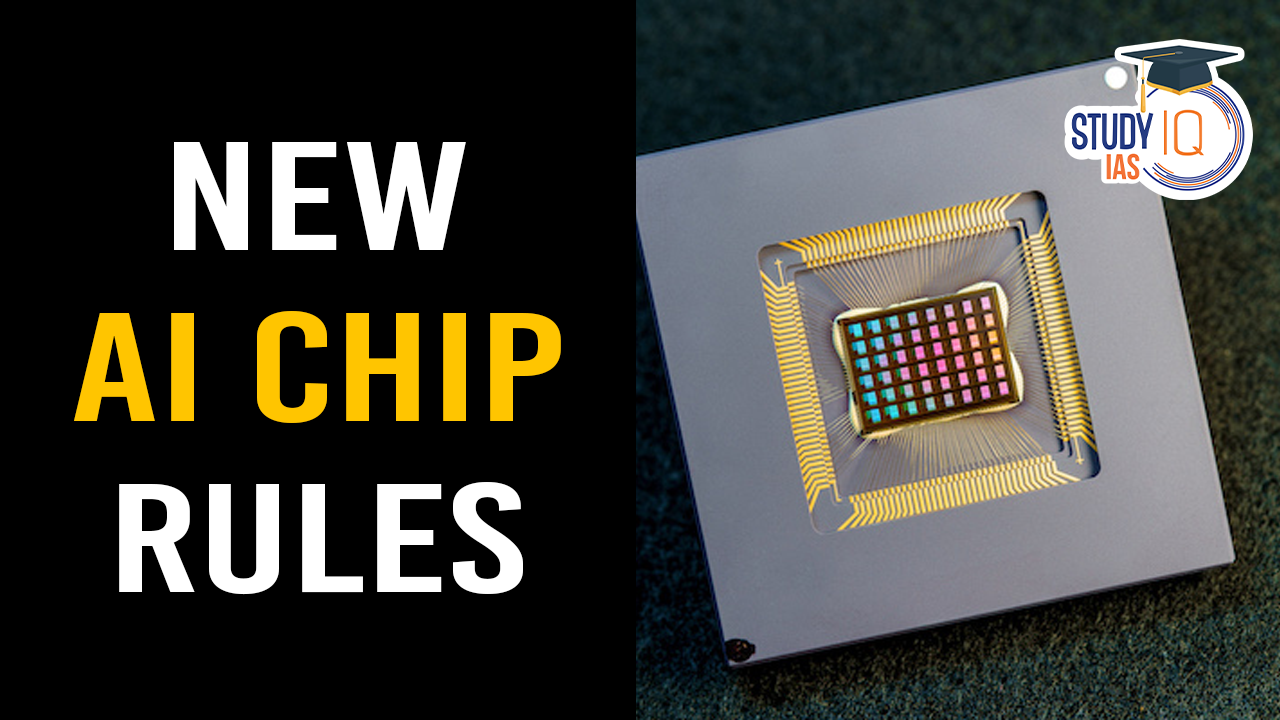Table of Contents
Context: The U.S. Bureau of Industry and Security (BIS) has introduced new regulations to control the export and transfer of Artificial Intelligence (AI) chips. This move is primarily aimed at curbing the potential misuse of advanced AI capabilities by certain countries while fostering secure and responsible development.
About the New Regulations
Restricted Chips
- Focus on GPUs: The regulation specifically targets Graphics Processing Units (GPUs), which were originally designed for gaming but have become essential for AI model training due to their parallel processing capabilities.
- Targeting Nvidia: Nvidia, a leading manufacturer of GPUs, is particularly affected by these restrictions.
Graphic Processing Unit (GPU)
- A GPU is a computer chip designed for rapid mathematical calculations to render graphics and images.
- Besides gaming, GPUs are critical in creative content creation, video editing, high-performance computing (HPC), and artificial intelligence (AI).
Total Processing Performance (TPP)
- The regulation imposes caps on compute power, a crucial performance metric for GPUs.
- Cap Details: Countries under the restriction will have a TPP cap of 790 million through 2027, roughly equivalent to 50,000 Nvidia H100 GPUs.
Exceptions and Exemptions
- Verified End User (VEU) Status: Companies with VEU status, such as Amazon Web Services and Microsoft Azure, are exempt from these caps. They can acquire significant numbers of GPUs, with projections allowing for up to 320,000 advanced GPUs over the next two years.
- Small Orders: Purchases of up to 1,700 H100 GPUs are not counted towards the cap, easing the procurement process for universities, research organizations, and medical institutions.
- Gaming GPUs: GPUs intended for gaming are exempt from the restrictions.
Countries with Unlimited Access
- Eighteen countries are exempt from these caps, including Australia, Belgium, Britain, Canada, Denmark, Finland, France, Germany, Ireland, Italy, Japan, Netherlands, New Zealand, Norway, South Korea, Spain, Sweden, Taiwan, and the U.S.
Impact on India
- Strategic Benefits: India stands to gain from the new regulations due to its strategic partnerships with the U.S.
- Investment Opportunities: With the restrictions targeting countries like China and Russia, investments may be redirected towards India, enhancing its role in the global AI and technology ecosystem. This could bolster India’s technological capabilities and position it as a key player in AI development and deployment.
- VEU Authorisation: Indian data centres aiming to deploy advanced AI chips now need to apply for VEU authorisation to expedite processes.
- The policy may redirect investments towards India, boosting its role in the global AI and tech ecosystem.
What Technology Do the Regulations Cover?
- Advanced Computing Chips: These are high-performance processors essential for training AI models.
- Closed AI Model Weights: AI models consist of mathematical operations applied to input data to generate output.
- Model Weights: These are specific parameters that dictate how AI models function.
- Model Architecture: Determines the quality and nature of AI outputs.
Total Processing Performance (TPP)
- The regulation sets caps on compute power, a key metric for GPU performance.
- Countries subject to the restriction will have a TPP cap of 790 million through 2027, equivalent to about 50,000 H100 GPUs.
Exceptions and Exemptions
- Verified End User (VEU) Status: Companies with special VEU status, like Amazon Web Services and Microsoft Azure, are exempt from caps. They can access large numbers of GPUs, such as 320,000 advanced GPUs over the next two years.
- Small Orders: Purchases of GPUs up to 1,700 H100 chips do not count toward the cap, simplifying the process for universities, research organizations and medical institutions.
- Gaming GPUs: Purchases of GPUs for gaming purposes are exempt from the restrictions.
Classification of Countries
The new rules update export, re-export, and transfer controls by segregating countries into three tiers:
- Tier 1: Includes 18 trusted allies and partners (Australia, Belgium, Britain, Canada, Denmark, Finland, France, Germany, Ireland, Italy, Japan, Netherlands, New Zealand, Norway, South Korea, Spain, Sweden, Taiwan)
- No restrictions on the export, re-export or transfer of advanced computing chips.
- Tier 2: Includes countries like China and India.
- Restrictions include:
- Caps on the volume of exported chips.
- VEU (Validated End User) Authorisation for transactions contributing to the development of advanced AI models.
- Exemptions for chips not contributing to advanced AI models (e.g., clusters with a collective computation power of ~1,700 advanced GPUs do not need authorisation).
- Restrictions include:
- Tier 3: Arms-embargoed countries like North Korea, Iraq, Iran, and Russia – No access to the technology.
Ready to turn your UPSC dreams into reality? Join the trusted StudyIQ UPSC Foundation P2I Live Hinglish Batches today! Our expert-led courses are designed to build a solid foundation while keeping you updated with the latest exam trends. Contact us now to enrol and get one step closer to cracking the UPSC exam with confidence


 Places in News for UPSC 2025 for Prelims...
Places in News for UPSC 2025 for Prelims...
 New Phase of Operation Chakra to Combat ...
New Phase of Operation Chakra to Combat ...
 Soyuz Aircraft: History, Design and Sign...
Soyuz Aircraft: History, Design and Sign...





















